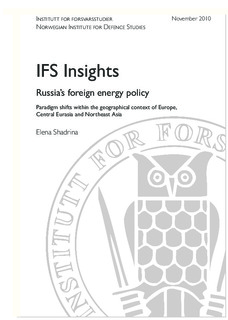| dc.description | Throughout the transition period, Russia was pursuing an energy policy composed of a set of responses to external developments. However, in the wake of the 2008 crisis, the government expedited the formulation of a new long-term energy strategy aiming to create a comprehensive energy policy to enhance Russia’s sustained development.
Externally, Russia’s decisions in 2009 to postpone its accession to the WTO and refrain from ECT ratification sounded alarmingly. However, Russia’s policy course taken in the overall setting was not entirely destructive. By proposing a conceptual framework for international energy cooperation (April 2009), Russia has demonstrated its willingness to become an actor in global energy governance. Recent transformations in Russia’s energy policy can be read within the context of Russia’s aim to conceptualise its vision of energy security more holistically.
Based on an understanding of Russia’s multirole status (producer, exporter, importer, consumer and transiter) in the energy arena, this work features the complexity of the content of Russia’s foreign energy policy; it also shows its diversity over space and depicts its flexibility over time. This examination is undertaken through the prism of Russia’s energy relations within three geographical loci: Europe, Central Eurasia and Northeast Asia. | en_US |
